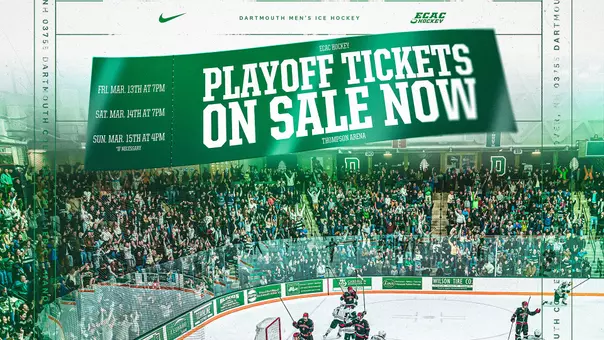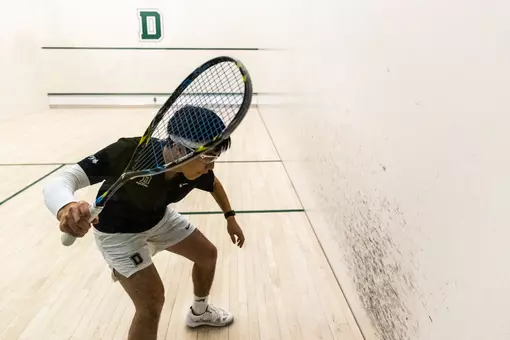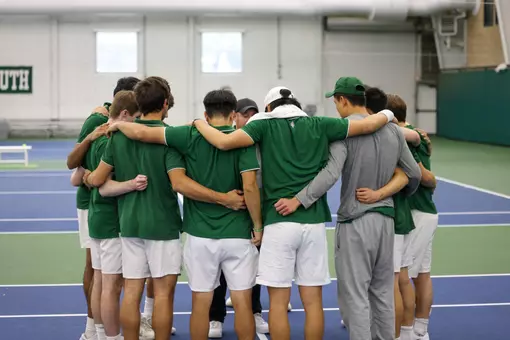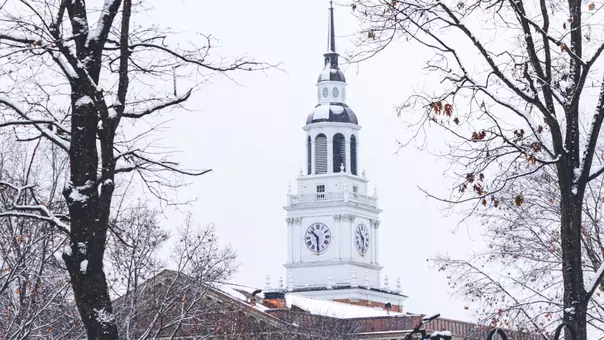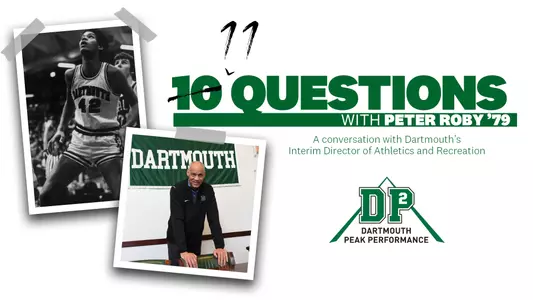
Photo by: Dartmouth
PEAK Magazine Feature: 11 Questions With Peter Roby
4/15/2021 10:00:00 AM | Athletics, Peak Performance
New Interim AD opens up in latest issue of PEAK.
How gratifying is it to be back at Dartmouth and serving as the Athletics Director at your alma mater?
Peter Roby '79: The full circle nature of my arrival on campus has not been lost on me. Having conversations recently with former teammates and classmates that were on campus around the time I was there, I couldn't help but think back and appreciate the nature of my return to campus, where my college experience began first as a student-athlete and then in my first coaching job, which set me off on this wonderful career working in athletics. Part of what has made me reminisce about it is how much I developed during my time as an undergraduate and how transformational that experience was. I've always looked back with such appreciation for the relationships I developed at Dartmouth with my teammates and head coach Gary Walters; relationships that I maintain 45 years later. For Gary, it was all about being an educator who happened to use sports to educate and help develop young people.
Who, besides Gary Walters, has had a big influence on your life?
PR: I can't really talk about those who influenced my life without talking about my father. He was someone who loved sports but never got a chance to go to high school and play sports. He instilled in me this love of sport and love of education and helped me appreciate how important a quality education was going to be in leveling the playing field. If you weren't from wealth, came from a different side of the city or your circumstances were such that you didn't have a lot of advantages, then the equalizer was a great education. That always stuck with me and was the reason why I wanted to attend a school with the kind of reputation academically that Dartmouth has.
When I was a student-athlete here, I met some wonderful people like Lee Julian, the widow of Doggie Julian, the great coach at Dartmouth and, before that, the Celtics. Lee took me under her wing and that led to a lifelong relationship with her and her children. It was inspiring to know I was connected to her husband's legacy; when I won the Doggie Julian Award as a senior, it was really special to me because I felt like I knew Coach Julian, through my relationship with Lee. Seaver Peters '54, the athletic director at the time, was also a big influence and played an important role in getting me to Dartmouth. Gary Dicovitsky '72, who was a player here and then my freshman coach, was such a wonderful, kind and caring person. He is a loyal son of Dartmouth in every way.
What are some of your near-term goals as you evaluate the landscape of Dartmouth Athletics?
PR: Given the circumstances around my return to campus, it is really important from a short-term standpoint that the goals be about making sure the student-athletes and coaches from those reinstated teams are getting all the attention they need and that we make them feel welcomed, respected and valued. For those that need new head coaches, it is important that we find quality people to lead those programs so we can stabilize them and focus on the future. Everything I do will be about putting the student-athlete at the center and making sure that any attempts we make to achieve success are done on behalf of the student-athletes and not at their expense.
What do you think are the biggest assets for the athletics department?
PR: I think the overall Dartmouth experience is a unique asset. Then, it's the people. We have extraordinary people involved on our campus who are talented and dedicated, so we want to make sure we value the people here and do what we can on their behalf. It's also our student-athletes. They are the real assets because they represent us and our values in the best possible way. The idea of not compromising academically or athletically represents the kinds of student-athletes that come to Dartmouth to compete. Next, it's our alumni. Not many colleges can brag about the loyalty and support that Dartmouth College has from its alumni. And finally, we have some of the most extraordinary facilities for any college athletics department, and you know that's a source of pride for all of us. It speaks to the college's commitment to the athletic department, but it also speaks to the loyalty and the generosity of so many donors.
Tying all that together is DP2 because of the unique organizational structure and the competitive advantage it gives us. The way we look at student-athlete wellness and performance through a collaborative lens is special.
What do you think are its biggest challenges?
PR: First, we must overcome some of the distrust and hurt that people are feeling right now, given what we've gone through. Building back that trust is going to take time, consistency and understanding which I totally get. As a College, we continue to be under pressure financially, so it's important we make really good choices about where money is spent so we can maximize its impact and also be really good stewards of private support we get from so many loyal donors. That way we can say, without hesitation, that we're putting those resources to really good use. The other challenge is that we are in a situation where we have seven other institutions that make up the Ivy Group that are really competitive and have talented people as well that are striving to achieve the same sort of goals that we're striving to achieve, and so that competition is keen. We must position ourselves for the future, to be able to compete with the other institutions in the Ivy League, and that's a formidable challenge. We are not going to be able to do that unless we come together as a community.
How would you describe your leadership style?
PR: My leadership style is a values driven one. I feel that it is important to espouse a certain set of expectations and values of how you want people to work together and how you want them to communicate. The consistency of that communication needs to be matched by consistency in our actions. I'm one that strongly believes in the connection between leadership and culture.
How has your previous professional work, including your tenures as AD and Director of the Center for the Study of Sport in Society at Northeastern, shaped the approach you bring to Dartmouth?
PR: My experience at Sport in Society had a really big impact on my work and how I go about it because I developed a real appreciation for social justice, equity and fairness, and the power of sport, and I try to bring that perspective to my work as an athletic director by viewing what we do through a social justice lens. That includes things like fairness, consistency, advocacy, empowerment and empathy. Those are all qualities that I try to bring to my work and came to appreciate from my time there.
What are your impressions of DP2 and the work it does to support the student-athletes?
PR: DP2 is unique and powerful because it brings together all of our resources to make a positive impact on the Dartmouth experience for our student-athletes. We are harnessing all our resources in an efficient way with respect to strength & conditioning, sports medicine, sports performance, counseling, academic support, community service, leadership development, diversity and inclusion, and mentoring. DP2 is a tangible representation of our values as an athletics department and it's powerful because you see it at work every day. I know there's not a day that goes by, when we're back to a full and normal experience, where the student-athletes and, in many cases, the coaches won't be touched by some aspect of DP2. It's a competitive advantage for us to have an organization and the people working in that area.
What are your personal philosophies on the importance of programs like DP2 at the collegiate level?
PR: There has been a real emergence of this collaborative approach to care delivery and support of the student-athlete experience, and it's something I came to appreciate when I was the athletic director at Northeastern. I tried to break down silos between strength & conditioning and sports medicine and bring them under one umbrella for the exact reason DP2 exists on our campus today. It is always about trying to bring resources together to work more efficiently on behalf of the student-athlete so they can be better prepared to compete at a high level, get them back on the field when they have an injury and try to do injury prevention on the front end. It's an innovative approach and fits right in with the philosophy I tried to articulate and execute when I was getting started in my athletics career at Northeastern.
In what ways would you like to see DP2 continue to grow?
PR: We need to meet the student-athletes where they are. I think the future of DP2 will come as a result of our experiences trying to address the needs of the 21st-century student-athlete. It's hard to know exactly, but I can tell you that given how innovative our DP2 staff is, how innovative our coaches are and how our athletes are striving for excellence, we will be pushed to find new solutions to the challenges that come our way over the next few decades.
What's your favorite memory from your playing days at Dartmouth?
PR: That's a tough one because there are so many, and because I had great teammates that loved each other and still do to this day. I would say that my favorite memory is being part of a team that went 4-22 as a sophomore to one that finished 14-12 as seniors, which was the second-best record in 20 years. We did that by staying together, believing in each other and trying to get better every day for each other. I think it's the arc of my career at Dartmouth and the relationships with my teammates and coaches that provided the real highlights.
Peter Roby '79: The full circle nature of my arrival on campus has not been lost on me. Having conversations recently with former teammates and classmates that were on campus around the time I was there, I couldn't help but think back and appreciate the nature of my return to campus, where my college experience began first as a student-athlete and then in my first coaching job, which set me off on this wonderful career working in athletics. Part of what has made me reminisce about it is how much I developed during my time as an undergraduate and how transformational that experience was. I've always looked back with such appreciation for the relationships I developed at Dartmouth with my teammates and head coach Gary Walters; relationships that I maintain 45 years later. For Gary, it was all about being an educator who happened to use sports to educate and help develop young people.
Who, besides Gary Walters, has had a big influence on your life?
PR: I can't really talk about those who influenced my life without talking about my father. He was someone who loved sports but never got a chance to go to high school and play sports. He instilled in me this love of sport and love of education and helped me appreciate how important a quality education was going to be in leveling the playing field. If you weren't from wealth, came from a different side of the city or your circumstances were such that you didn't have a lot of advantages, then the equalizer was a great education. That always stuck with me and was the reason why I wanted to attend a school with the kind of reputation academically that Dartmouth has.
When I was a student-athlete here, I met some wonderful people like Lee Julian, the widow of Doggie Julian, the great coach at Dartmouth and, before that, the Celtics. Lee took me under her wing and that led to a lifelong relationship with her and her children. It was inspiring to know I was connected to her husband's legacy; when I won the Doggie Julian Award as a senior, it was really special to me because I felt like I knew Coach Julian, through my relationship with Lee. Seaver Peters '54, the athletic director at the time, was also a big influence and played an important role in getting me to Dartmouth. Gary Dicovitsky '72, who was a player here and then my freshman coach, was such a wonderful, kind and caring person. He is a loyal son of Dartmouth in every way.
What are some of your near-term goals as you evaluate the landscape of Dartmouth Athletics?
PR: Given the circumstances around my return to campus, it is really important from a short-term standpoint that the goals be about making sure the student-athletes and coaches from those reinstated teams are getting all the attention they need and that we make them feel welcomed, respected and valued. For those that need new head coaches, it is important that we find quality people to lead those programs so we can stabilize them and focus on the future. Everything I do will be about putting the student-athlete at the center and making sure that any attempts we make to achieve success are done on behalf of the student-athletes and not at their expense.
What do you think are the biggest assets for the athletics department?
PR: I think the overall Dartmouth experience is a unique asset. Then, it's the people. We have extraordinary people involved on our campus who are talented and dedicated, so we want to make sure we value the people here and do what we can on their behalf. It's also our student-athletes. They are the real assets because they represent us and our values in the best possible way. The idea of not compromising academically or athletically represents the kinds of student-athletes that come to Dartmouth to compete. Next, it's our alumni. Not many colleges can brag about the loyalty and support that Dartmouth College has from its alumni. And finally, we have some of the most extraordinary facilities for any college athletics department, and you know that's a source of pride for all of us. It speaks to the college's commitment to the athletic department, but it also speaks to the loyalty and the generosity of so many donors.
Tying all that together is DP2 because of the unique organizational structure and the competitive advantage it gives us. The way we look at student-athlete wellness and performance through a collaborative lens is special.
What do you think are its biggest challenges?
PR: First, we must overcome some of the distrust and hurt that people are feeling right now, given what we've gone through. Building back that trust is going to take time, consistency and understanding which I totally get. As a College, we continue to be under pressure financially, so it's important we make really good choices about where money is spent so we can maximize its impact and also be really good stewards of private support we get from so many loyal donors. That way we can say, without hesitation, that we're putting those resources to really good use. The other challenge is that we are in a situation where we have seven other institutions that make up the Ivy Group that are really competitive and have talented people as well that are striving to achieve the same sort of goals that we're striving to achieve, and so that competition is keen. We must position ourselves for the future, to be able to compete with the other institutions in the Ivy League, and that's a formidable challenge. We are not going to be able to do that unless we come together as a community.
How would you describe your leadership style?
PR: My leadership style is a values driven one. I feel that it is important to espouse a certain set of expectations and values of how you want people to work together and how you want them to communicate. The consistency of that communication needs to be matched by consistency in our actions. I'm one that strongly believes in the connection between leadership and culture.
How has your previous professional work, including your tenures as AD and Director of the Center for the Study of Sport in Society at Northeastern, shaped the approach you bring to Dartmouth?
PR: My experience at Sport in Society had a really big impact on my work and how I go about it because I developed a real appreciation for social justice, equity and fairness, and the power of sport, and I try to bring that perspective to my work as an athletic director by viewing what we do through a social justice lens. That includes things like fairness, consistency, advocacy, empowerment and empathy. Those are all qualities that I try to bring to my work and came to appreciate from my time there.
What are your impressions of DP2 and the work it does to support the student-athletes?
PR: DP2 is unique and powerful because it brings together all of our resources to make a positive impact on the Dartmouth experience for our student-athletes. We are harnessing all our resources in an efficient way with respect to strength & conditioning, sports medicine, sports performance, counseling, academic support, community service, leadership development, diversity and inclusion, and mentoring. DP2 is a tangible representation of our values as an athletics department and it's powerful because you see it at work every day. I know there's not a day that goes by, when we're back to a full and normal experience, where the student-athletes and, in many cases, the coaches won't be touched by some aspect of DP2. It's a competitive advantage for us to have an organization and the people working in that area.
What are your personal philosophies on the importance of programs like DP2 at the collegiate level?
PR: There has been a real emergence of this collaborative approach to care delivery and support of the student-athlete experience, and it's something I came to appreciate when I was the athletic director at Northeastern. I tried to break down silos between strength & conditioning and sports medicine and bring them under one umbrella for the exact reason DP2 exists on our campus today. It is always about trying to bring resources together to work more efficiently on behalf of the student-athlete so they can be better prepared to compete at a high level, get them back on the field when they have an injury and try to do injury prevention on the front end. It's an innovative approach and fits right in with the philosophy I tried to articulate and execute when I was getting started in my athletics career at Northeastern.
In what ways would you like to see DP2 continue to grow?
PR: We need to meet the student-athletes where they are. I think the future of DP2 will come as a result of our experiences trying to address the needs of the 21st-century student-athlete. It's hard to know exactly, but I can tell you that given how innovative our DP2 staff is, how innovative our coaches are and how our athletes are striving for excellence, we will be pushed to find new solutions to the challenges that come our way over the next few decades.
What's your favorite memory from your playing days at Dartmouth?
PR: That's a tough one because there are so many, and because I had great teammates that loved each other and still do to this day. I would say that my favorite memory is being part of a team that went 4-22 as a sophomore to one that finished 14-12 as seniors, which was the second-best record in 20 years. We did that by staying together, believing in each other and trying to get better every day for each other. I think it's the arc of my career at Dartmouth and the relationships with my teammates and coaches that provided the real highlights.
Women's Lacrosse Postgame vs Holy Cross 3.2.26
Monday, March 02
Men's Basketball at Princeton Postgame Interview 2.28.26
Sunday, March 01
Men's Hockey Media Availability vs Princeton 2.28.26
Sunday, March 01
Women's Basketball Postgame vs. Penn - 2.28.26
Sunday, March 01

